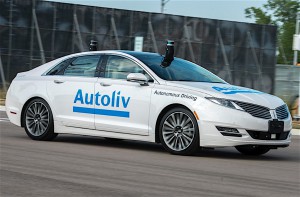
Autoliv is expanding its presence in metro Detroit as its businesses continue to grow, including its autonomous vehicle technology.
Autoliv, the company that stepped in following the Takata bankruptcy to supply safety equipment, including airbags and seatbelts, to carmakers around the world, is preparing for a major expansion in North America.
The company, which is based in Stockholm, Sweden, has broken ground for the company’s North American Electronics Technical Center in Southfield, Michigan, just outside of Detroit that will ultimately house more than 900 employees when it completed in 2019.
The new 180,000 square foot Electronics Technical Center will be complete in the first half of 2019 and is expected to enable Autoliv’s growth in several key safety electronics technologies by providing needed office space and advanced laboratories for engineering, sales and other management functions for electronics organization.
It will be a focal point for developing Automotive Safety Electronics systems and includes a full development garage. The current 600 Autoliv Electronics employees, housed in the multiple nearby Southfield buildings today, will be re-located to this new facility. Autoliv expects to offer 250 new jobs at this site, during the next five years, mainly in electronics engineering.
“We have grown significantly since opening our Southfield office in 2002, and it has long been our hope to expand in this area,” noted Canice Boran, vice president, North American Electronics Engineering.
“Autoliv’s mission is to be the leading supplier of safety systems for the future car. We are excited by the opportunity our new high-tech facility will provide our people to collaboratively innovate and develop our Electronics systems, and ultimately contribute to saving more lives,” he added.
In the wake of Takata’s bankruptcy and continuing legal troubles, Autoliv has become one of the industry’s preferred suppliers of automotive safety equipment, including airbags.
However, the company’s sole focus isn’t the aforementioned safety equipment. Autoliv is one of the many company’s actively pursuing autonomous vehicle technologies. It has partnerships with Nvidia and Volvo Cars.
Volvo Cars and Autoliv last year launched a venture called Zenuity to develop autonomous vehicle software. This summer, thy expanded that alliance to include Nvidia, a firm known for its computer graphics technology.
Together, the three partners hope to have the first fully autonomous Volvo on sale by 2021, and they could offer their software to other automakers, as well. Volvo has also been providing vehicles for testing by ride-sharing firm Uber.

